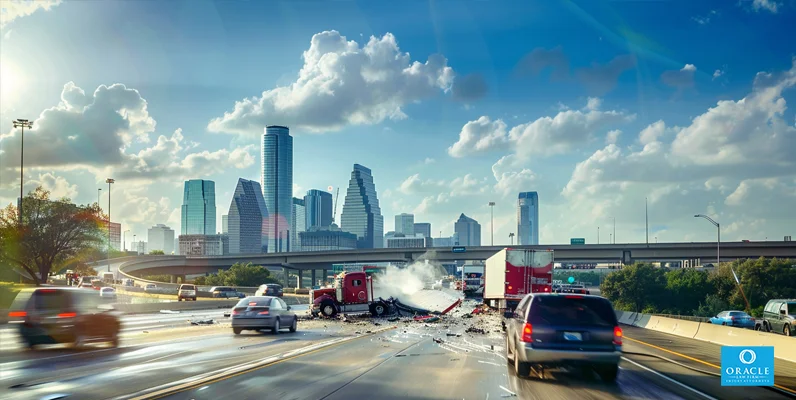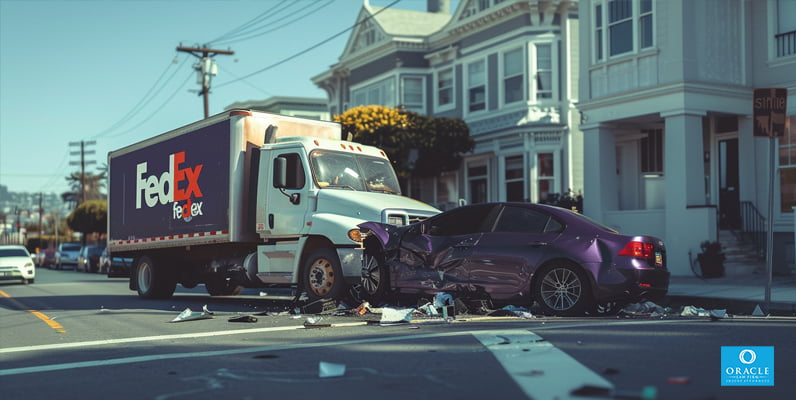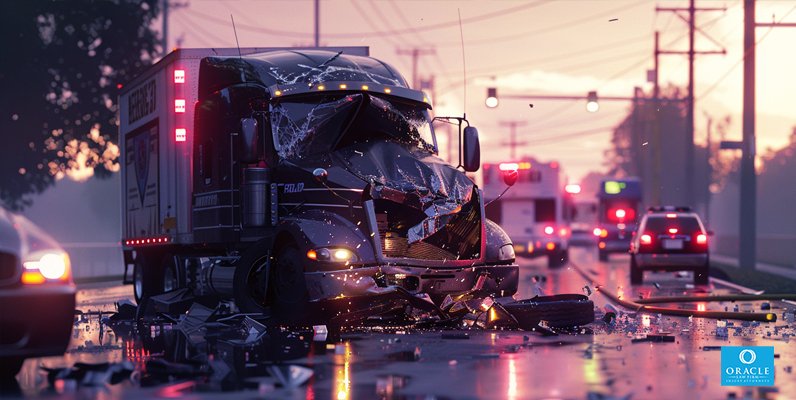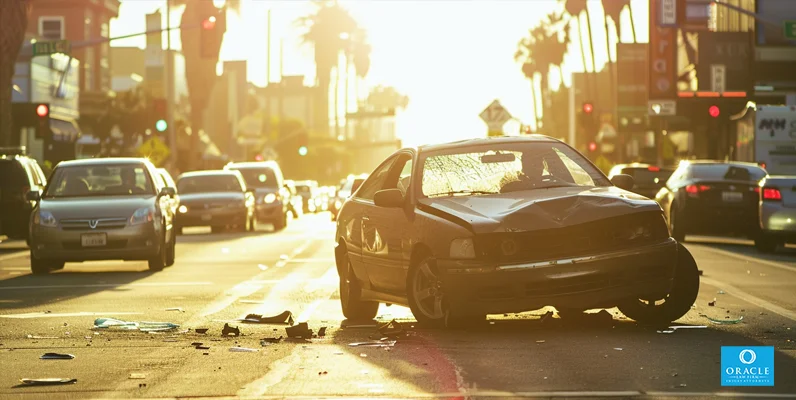A fatal truck accident lawyer provides crucial legal representation to families affected by tragic road incidents. They focus on achieving justice through compensation, assuaging some of the financial burdens following these catastrophic events. This article outlines how such lawyers operate and what to expect as they advocate on your behalf.
Key Takeaways
- Fatal truck accident rates have increased significantly, highlighting the urgent need for expert legal representation to help victims and their families.
- Fatal truck accident lawyers specialize in investigating accidents, negotiating with insurance companies, and litigating to ensure fair compensation to the victims.
- Determining liability in fatal truck accidents involves multiple potentially responsible parties and complex legal aspects, necessitating skilled legal assistance.
Fatal Truck Accident Statistics
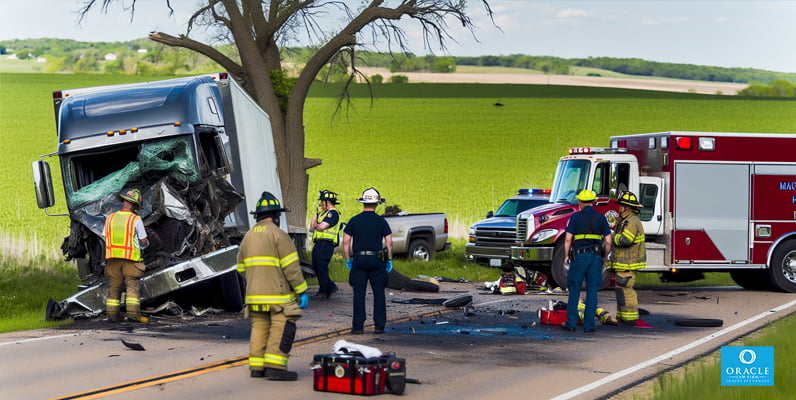
The escalating trend of fatal truck accidents in recent years is quite alarming. In 2021 alone, more than half a million large truck accidents were recorded across the U.S., with fatalities reaching a staggering 5,646. This represents a significant year-on-year growth in fatal accidents involving large trucks and 18-wheelers, which increased by 26% from 2020 to 2021. These statistics highlight the necessity for a robust legal response to the daunting reality of truck accidents on our roads.
These accidents often occur on rural roads and interstate highways, with 54% of fatalities in 2020 happening in rural areas and 27% on interstates. The majority of these incidents happen between Monday and Friday, with 82% of deaths and 87% of injuries occurring within these days. Such data emphasize the importance of truck drivers, other motorists, and trucking companies exercising extra caution during these periods.
The Role of a Fatal Truck Accident Lawyer

Navigating the legalities of truck accidents can be intricate, given the complexities of regulations and the diverse parties involved. This is when the role of a fatal truck accident lawyer becomes significant. These specialists, often found at a reputable truck accident law firm, provide expertise in handling crashes involving large commercial vehicles, offering their proficiency in investigation, negotiation, and litigation to secure fair compensation for victims and their families.
This paves the way for a deeper understanding of their roles, which we will delve into in the subsequent sections.
Investigating the Accident

The investigation stage is a critical part of a truck accident claim. This involves an in-depth examination of:
- the accident scene
- truck maintenance records
- cargo loading procedures
- equipment functionality
Given the potential for evidence to decay or disappear, the need for swift legal action following an accident is of utmost importance.
Lawyers employ various tools in their investigation, including:
- truck drivers’ logbooks
- toll tickets
- fuel receipts
- cell phone records
Additionally, expert witnesses such as accident reconstruction specialists play a significant role in establishing liability. A thorough investigation can uncover crucial factors, including driver error, poor vehicle maintenance, improper cargo loading, faulty equipment, or roadway violations.
Negotiating with Insurance Companies
Engaging with insurance companies is a delicate process that requires skill and knowledge. Truck accident lawyers are adept at spotting and countering maneuvers by insurance companies aiming to reduce or deny deserving claims. This negotiation ensures precise documentation and validation of victims’ injuries and losses.
These lawyers at the law firm work tirelessly to:
- Prevent victims from hastily settling for insufficient compensation offers
- Ensure that settlements reflect the comprehensive impact of the accident
- Strengthen the negotiating position by being ready to proceed to trial, if necessary
- Take a thorough approach to secure equitable compensation
Litigating the Case
Litigation is a complex process that requires meticulous preparation and a compelling narrative backed by factual evidence and expert testimony. Attorneys focus on proving the defendant’s negligence by presenting violations of regulations or traffic laws and evidence of driver error. They also demonstrate the impact of the victim’s losses, both emotional and financial, to secure fair compensation.
The case may proceed to trial if no acceptable offer arises from settlement negotiations. Here, a judge or jury will determine the compensation based on the presented evidence. This underlines the importance of having attorneys with trial experience, as they are crucial when a truck accident case goes to court to defend against accusations and establish the truck driver’s liability.
Determining Liability in Fatal Truck Accidents
Determining liability in fatal truck accidents can be complex, often involving multiple parties. These may include truck drivers, trucking companies, manufacturers, maintenance companies, and cargo-loading entities. This complexity arises from the diverse factors that can contribute to an accident, including driver error, vehicle malfunction due to defective parts, and unsafe road conditions.
In some jurisdictions, the determination of liability may be influenced by laws dictating the conditions under which trucking companies can be sued concerning their commercial truck drivers’ faults. Furthermore, Federal regulations requiring trucking companies to maintain records of their drivers’ accident history can also affect liability determination.
This underscores the necessity of a seasoned truck accident lawyer, well-versed in truck accident law, to decode the complexities of liability in fatal truck accidents and navigate truck accident lawsuits.
Types of Compensation in Fatal Truck Accident Cases

In the aftermath of a fatal truck accident, victims and their families can seek two types of compensation: economic and non-economic damages. These compensatory damages aim to restore the plaintiff’s physical, financial, and psychological state as closely as possible to their pre-accident condition.
Now, we will delve into these two types of damages in greater detail.
Economic Damages
Economic damages cover quantifiable losses such as medical bills, lost income, and property damage. These damages include emergency medical care, doctor bills, hospital stays, prescription medications, physical therapy, and any long-term or future medical care necessitated by the accident. In cases where the victim eventually succumbs to their injuries, the estate may recover economic damages such as medical costs incurred before death.
Lost wages, another crucial component of economic damages, include the income the victim could not earn due to their injuries, as well as compensation for the loss of future earning capacity if they cannot return to their previous employment role. Property damage claims may include compensation for repairs or replacement of vehicles and other personal items damaged in the accident. Other potential economic damages may include transportation costs related to the accident, such as travel to medical appointments.
Non-Economic Damages
Non-economic damages provide reparation for less tangible losses, such as pain and suffering, emotional distress, and diminished quality of life. The survivors of a fatal truck accident may claim damages for the psychological impact of their loss, which can manifest as anxiety, depression, and post-traumatic stress disorder.
These damages also cover the loss of companionship, addressing the impact on relationships with the deceased, particularly the loss of marital benefits. For family members, the loss of the deceased’s care, companionship, and guidance can be a devastating blow, and non-economic damages seek to compensate for these losses. In some states, there may be caps on pain and suffering awards in commercial vehicle accidents, which could limit the recoverable non-economic damages.
Factors Influencing the Value of a Fatal Truck Accident Claim
The value of a fatal truck accident claim is influenced by several factors, including:
- The severity of the injuries sustained in the truck crash
- The overall impact on the victim’s life and future financial stability
- The behavior of the truck driver, such as drug or alcohol use, fatigue, and adherence to federal regulations
These factors can significantly affect the claim’s value.
Legal aspects like state laws, legislative changes, and the employment status of the truck driver can impact the settlement values. Violations of federal and state regulations, such as hours of service rules, are critical in determining a truck driver’s liability for the accident. In cases of serious misconduct by the defendant, punitive damages may be awarded, further increasing the overall claim value.
How to Choose the Right Fatal Truck Accident Lawyer
Selecting a suitable fatal truck accident lawyer is a decision of utmost significance. A lawyer’s understanding of relevant laws, demonstrated by their experience with truck accident claims, and a record of securing fair settlements for their clients is a key consideration. Practical communication skills are also crucial in this relationship. An attorney who provides clear updates and explains legal terms plainly can significantly ease the often stressful legal process.
Understanding the attorney’s cost structure, including whether they operate on a contingency-fee basis, is critical to avoid surprise fees later in the legal proceedings. Additionally, the attorney’s ability to dedicate time to the case is essential. A lawyer from a well-resourced firm may bring advantages such as access to advanced accident reconstruction technology.
Lastly, researching the attorney’s professional background, checking their bar status, and reading past client reviews or testimonials can provide valuable insights into their legal practice and client satisfaction.
Time Limits for Filing a Fatal Truck Accident Lawsuit
Depending on the state, the time frame to file a wrongful death lawsuit after a fatal truck accident usually ranges from one to three years for personal injury claims. Variations exist across states, such as Florida’s reduction to two years for personal injury cases and New York’s three-year period for truck accident claims.
Missing the statute of limitations deadline can result in the lawsuit’s dismissal, underlining the urgency for prompt legal action following a fatal truck accident. The statute of limitations may be tolled under exceptional circumstances, such as when the victim is a minor or legally incompetent, and the discovery rule can alter the filing period if injuries were initially unknown.
Steps to Take Following a Fatal Truck Accident

In the regrettable occurrence of a fatal truck accident, it is crucial to be aware of the appropriate steps to undertake. Immediately calling 911 to ensure that emergency services and law enforcement are dispatched to the scene is essential for safety and legal reasons. Seeking medical attention promptly after a truck accident is crucial, even if no injuries are evident, to address potential life-threatening conditions and obtain medical records for the claim.
If safe to do so, collecting evidence at the scene by taking photos, gathering witness contact information, and noting environmental conditions is essential. Avoid attempting vehicle repairs, admitting fault, or discussing accident details at the scene or with insurers, and refrain from posting about the accident on social media to safeguard the integrity of your claim.
Engaging a truck accident lawyer is essential to evaluating your legal options and securing a successful lawsuit and just compensation, whether you’ve been involved in a car accident or a truck accident.
Summary
Understanding the dynamics of fatal truck accidents, the role of a competent truck accident lawyer, and the legal processes surrounding such incidents is invaluable. The intricacies of investigating the accident, negotiating with insurance companies, litigating the case, determining liability, and understanding the types of compensation can be overwhelming. However, with the right legal assistance and knowledge, victims and their families can navigate these complexities and secure fair compensation. Stay informed, stay prepared, and remember, you’re not alone in this journey.
Frequently Asked Questions
How much are most truck accident settlements?
The average truck accident settlement amount is approximately $73,109, including cases involving tractor-trailers and heavy/commercial trucks.
What is the role of a fatal truck accident lawyer?
A fatal truck accident lawyer specializes in handling crashes involving large commercial vehicles, providing investigation, negotiation, and litigation expertise to secure fair compensation for victims and their families.
How is liability determined in fatal truck accidents?
Liability in fatal truck accidents can be complex and involves multiple parties, such as the truck driver, trucking company, manufacturers, maintenance companies, and cargo loaders. Determining liability requires thorough investigation and legal expertise.
What are the types of compensation in fatal truck accident cases?
In fatal truck accident cases, compensation can include economic damages for medical bills and lost wages, as well as non-economic damages for loss of companionship and emotional distress.
What are the factors influencing the value of a fatal truck accident claim?
The value of a fatal truck accident claim is influenced by factors such as the severity of injuries, driver actions, state laws, employment status, and violations of federal and state regulations. These elements play a crucial role in determining the compensation amount.
